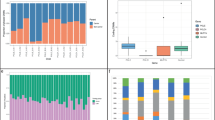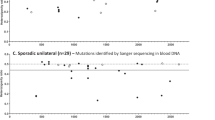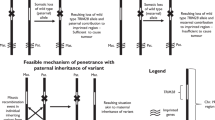Abstract
THE event triggering malignant proliferation in 70% of retinoblastoma tumours is loss of heterozygosity for chromosome 13ql4, whereby the normal retinoblastoma gene (RB1) allele is lost and an already mutated RB1 allele remains in the tumour1-3. The first allele suffers a mutational event—deletion, duplication or point mutation (manuscript in preparation)—either in the germ line (all bilateral patients) or in a somatic retinal cell (most unilateral patients). Most bilateral patients have no family history of retinoblastoma and are presumed to have new germline mutations which arose in the egg, sperm or early embryo. We have determined the parental origin of the retained allele in nine retinoblastoma tumours from eight unrelated non-familial cases by using RB1-linked genetic markers. Six tumours retained the paternal allele and three retained the maternal allele. Of the three unilateral tumours, only one retained the paternal RB1 allele. Thus, there is no evidence that the paternal RB1 allele is preferentially retained in retinoblastoma, as has been suggested to be the case in osteosar-coma4,5. By contrast, tumours from four of the five bilateral patients retained the paternal RB1 allele. This suggests either that new germline RB1 mutations arise more frequently during sper-matogenesis than during oogenesis, or that imprinting in the early embryo affects chromosomal susceptibility to mutation.
This is a preview of subscription content, access via your institution
Access options
Subscribe to this journal
Receive 51 print issues and online access
$199.00 per year
only $3.90 per issue
Buy this article
- Purchase on Springer Link
- Instant access to full article PDF
Prices may be subject to local taxes which are calculated during checkout
Similar content being viewed by others
References
Knudson, A. G. Proc. natn. Acad. Sci. U.S.A. 68, 820–823 (1971).
Cavenee, W. K. et al. Nature 305, 779–784 (1983).
Godbout, R., Dryja, T. P., Squire, J., Gallie, B. L. & Phillips, R. A. Nature 304, 451–453 (1983).
Toguchida, J. et al. Nature 338, 156–158 (1989).
Toguchida, J. et al. Cancer Res. 48, 3939–3943 (1988).
Abramson, D. H., Ellsworth, R. M., Kitchin, F. D. & Tung, G. Ophthalmology 91, 1351–1355 (1984).
Draper, G. J., Sanders, B. M. & Kingston, J. E. Br. J. Cancer 53, 661–671 (1986).
Roarty, J. D., McLean, I. W. & Zimmerman, L. E. Ophthalmology 95, 1583–1587 (1988).
Hansen, M. F. et al. Proc. natn. Acad. Sci. U.S.A. 82, 6216–6220 (1985).
Orkin, S. H., Goldman, D. & Sallan, S. E. Nature 309, 172–174 (1984).
Reeve, A. E. et al. Nature 309, 174–176 (1984).
Schroeder, W. T. et al. Am. J. hum. Genet. 40, 413–420 (1987).
Wilkins, R. J. Lancet i, 329–331 (1988).
Squire, J., Gallie, B. L. & Phillips, R. A. Hum. Genet. 70, 291–301 (1985).
Benedict, W. F. et al. Cancer Res. 47, 4189–4191 (1987).
Dryja, T. P. et al. N. Engl. J. med. 310, 550–553 (1984).
Dryja, T. P. et al. Nature 339, 556–558 (1989).
Dunn, J. M., Phillips, R. A., Becker, A. J. & Gallie, B. L. Science 241, 1797–1800 (1988).
Matsunaga, E. Hum. Genet. 62, 124–128 (1982).
Gallie, B. L., Albert, D. M., Wong, J. J. Y., Buyukmikci, N. & Puliafita, C. A. Invest. Ophthal. 16, 256–259 (1977).
Gallie, B. L., Holmes, W. & Phillips, R. A. Cancer Res. 42, 301–305 (1982).
Maniatis, T., Fritsch, E. F. & Sambrook, J. Molecular Cloning: a Laboratory Manual (Cold Spring Harbor Laboratory, New York, 1982).
Wiggs, J. et al. N. Engl. J. Med. 318, 151–157 (1988).
Cavenee, W., Leach, R., Mohandas, T., Pearson, P. & White, R. Am. J. hum. Genet. 36, 10–24 (1984).
Squire, J. et al. Proc. natn. Acad. Sci. U.S.A. 83, 6573–6577 (1986).
Feinberg, A. P. & Vogelstein, B. Analyt. Biochem. 132, 6–13 (1983).
Reed, K. C. & Mann, D. A. Cancer Res. 37, 1003–1010 (1985).
Goddard, A. D. et al. Molec. cell. Biol. 8, 2082–2088 (1988).
Author information
Authors and Affiliations
Rights and permissions
About this article
Cite this article
Zhu, X., Dunn, J., Phillips, R. et al. Preferential germline mutation of the paternal allele in retinoblastoma. Nature 340, 312–313 (1989). https://doi.org/10.1038/340312a0
Received:
Accepted:
Issue Date:
DOI: https://doi.org/10.1038/340312a0
This article is cited by
-
Impact of RB1 gene screening from blood collected on a single day from 411 family members of 113 Retinoblastoma survivors in India
Eye (2024)
-
Frequency of low-level and high-level mosaicism in sporadic retinoblastoma: genotype–phenotype relationships
Journal of Human Genetics (2020)
-
Retinoblastoma and ambient exposure to air toxics in the perinatal period
Journal of Exposure Science & Environmental Epidemiology (2015)
-
Maternal diet during pregnancy and unilateral retinoblastoma
Cancer Causes & Control (2015)
-
Parental nutrient intake and risk of retinoblastoma resulting from new germline RB1 mutation
Cancer Causes & Control (2013)
Comments
By submitting a comment you agree to abide by our Terms and Community Guidelines. If you find something abusive or that does not comply with our terms or guidelines please flag it as inappropriate.



